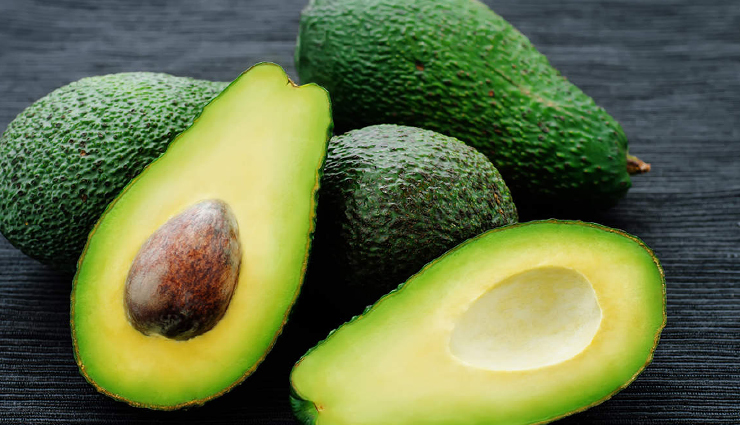- Home›
- Healthy Living›
- 6 Nutritional Health Benefits Of Consuming Avocado
6 Nutritional Health Benefits Of Consuming Avocado
By: Shikha Fri, 03 Feb 2023 2:37:09

Avocado is a widely popular fruit that is widely used in many different cuisines. It has a creamy texture and a mild, nutty flavor. Avocado is native to Mexico and Central America and is now cultivated in many other countries. It is also now widely available in grocery stores and restaurants.
Avocado is a very nutritious food, providing a good source of many essential vitamins and minerals. It is high in monounsaturated fatty acids, which are healthy fats that can help reduce inflammation and protect the heart. It is also a good source of fiber, which can help promote digestive health. Avocado is also a good source of potassium, which is important for maintaining healthy blood pressure and muscle function.
Avocado can be eaten on its own or used in a variety of recipes. It is often used in salads, sandwiches, and smoothies. It can also be used as a spread or dip. Avocado is also commonly used in guacamole and other Mexican dishes.
Avocado is a versatile ingredient that can be used in a variety of recipes. It pairs well with many different flavors and can be used as a topping, spread, or dip. Avocado can also be used in baking and cooking.

# Avocado is high in nutrients
Avocado is a nutrient-dense superfood, containing a variety of vitamins and minerals such as vitamin K, folate, vitamin C, potassium, vitamin B6, and more. This makes it a great addition to any healthy diet. It is a good source of healthy fats, dietary fiber, vitamins and minerals, including potassium, vitamin C, vitamin E, and vitamin K. When ripe, the flesh of an avocado is buttery and has a mild flavor that can be enjoyed in a variety of dishes, including salads, smoothies, guacamole, sandwiches, and more.

Avocado is heart-healthy
The healthy fats in avocado can help reduce cholesterol levels, which can help protect your heart. Avocados are a great source of monounsaturated fatty acids, which can help reduce LDL (bad) cholesterol and raise HDL (good) cholesterol levels. They are also high in fiber, antioxidants, and potassium, which can help lower blood pressure, reduce inflammation, and improve heart health. Furthermore, they are a great source of vitamins B, E, and K, which can help improve overall health.

# Avocado is beneficial for digestion
Avocado is a good source of dietary fiber, which is important for maintaining digestive health. A one-cup serving of avocado provides about 25% of an adult's daily recommended intake of dietary fiber. This helps to keep the digestive system running smoothly, and can help to prevent constipation. Avocado is also high in monounsaturated fats, which can help to reduce inflammation in the digestive tract. Additionally, avocado is a good source of vitamins and minerals that help to support the digestive system. These include folate, magnesium, potassium, and vitamins A, C, and E.

# Avocado is good for weight management
Avocados are low in calories and high in fiber and healthy fats, which can help you feel full longer and make it easier to manage your weight. Avocado can indeed help maintain weight. It is a nutrient-dense food that is high in fiber and healthy fats, which can help keep you full and satisfied for longer periods of time. Eating avocados can also help increase your intake of essential vitamins and minerals like potassium, folate, and vitamins C, E, and K. Avocados are low in calories and contain monounsaturated fatty acids, which have been linked to reduced risk of obesity and weight gain. Additionally, studies suggest that adding avocado to meals can lead to increased satiety and reduced calorie intake.

# Avocado can help protect your skin
The healthy fats and antioxidants in avocado can help protect your skin from damage and keep it looking healthy and youthful. Avocado can help protect your skin from sun damage. It contains high levels of antioxidants, which can help protect your skin from damaging UV rays. Avocados are also rich in fatty acids, which can help keep your skin hydrated and healthy. Additionally, the vitamin E found in avocados can help fight wrinkles and other signs of aging.

# Avocado can help reduce inflammation
Avocado is an excellent source of nutrients and is known for its anti-inflammatory properties. Studies have shown that avocado can help reduce inflammation, particularly in the joints and muscles. It contains high levels of monounsaturated fats, which help reduce inflammation in the body. It is also rich in antioxidants, which can help protect cells from damage caused by inflammation. Avocado is also a great source of vitamins and minerals, including vitamin C, vitamin E, and potassium, which can help reduce inflammation. Eating avocado regularly can help reduce inflammation in the body and protect against chronic inflammation.





